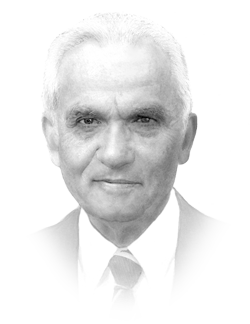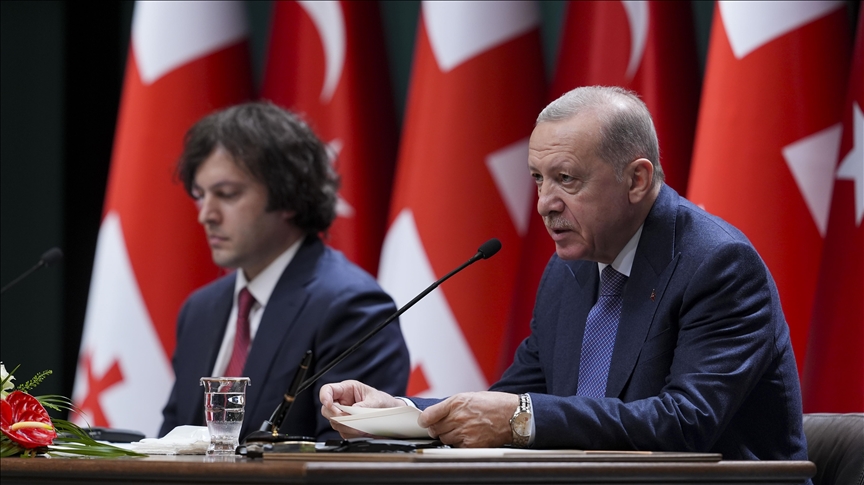Turkiye making strides in improving its air force
Turkiye making strides in improving its air force

The Turkish air force last month carried out the first test flight of its fifth-generation fighter jet. This test has the potential to change paradigms in Turkiye, Turkish-Greek relations and Turkish-American relations.
The US has done everything it can to prevent its NATO ally Turkiye from improving its air force. This started in 1964, when US President Lyndon Johnson sent a letter to Turkish Prime Minister Ismet Inonu telling him that, in case the Soviet Union attacks Turkiye because of the Cyprus problem, NATO may not come to Ankara’s aid. This was in stark contrast to the obligations of the NATO alliance. Inonu responded that, in this case, a new world order would emerge and Turkiye would find its place.
More than 10 years later, amid clashes between Greek Cypriots and Turkish Cypriots, the Turkish military carried out an operation on the island. As a reaction to Turkiye’s move, the US Congress took the decision to impose an embargo on the supply of military equipment to Ankara.
This became a turning point in Turkiye’s attitude to the manufacturing of the military equipment it needed. But it took several years for the country to develop its defense industry and start to manufacture the military equipment that its NATO ally refused to provide.
A similar attitude was adopted by the US more recently, when it withheld the delivery of the spare parts required for the upgrading of about 90 F-16 fighter aircraft that are in Turkiye’s air force inventory.
Ankara understood that reliance on a foreign country for the provision of defense equipment has risks. Therefore, it started to slowly develop its defense industry. The first contract signed with a Turkish defense company dates back to 2010. Many other national projects are now underway.
In 2007, an unmanned drone manufactured by a private Turkish company entered Turkiye’s air force inventory. Other more sophisticated manned and unmanned drones followed. Ankara had cooperation with Ukraine in the field of defense before the outbreak of the Ukrainian war and this cooperation was not interrupted by Russia’s invasion. As this was a commercial deal, Moscow did not formally object to the cooperation between Turkiye and Ukraine.
Turkish drones played a very important role during the 2020 Azerbaijan-Armenia war and changed the destiny of the conflict. After the drones proved their efficiency, other countries purchased them. The number of countries that have purchased Turkish-made manned and unmanned drones now exceeds 25. They include several Middle Eastern, Central Asian, African and European nations.
Last December, the Stockholm International Peace Research Institute published a list of the world’s top 100 arms-producing and military services companies. Four Turkish defense industry companies (Aselsan, Baykar, Tusas and Roketsan) were included in this list. Furthermore, Baykar was the fastest-growing company in the list with a 94 percent increase in its yearly income.
Ankara understood that reliance on a foreign country for the provision of defense equipment has risks.
Yasar Yakis
Unmanned drones manufactured by Turkiye have distinguished themselves with their performance in Libya, Montenegro and Ukraine. Ukrainians have even composed a song praising the Turkish-made Bayraktar drones.
Turkiye has now entered a new era thanks to the test flight of its first fighter aircraft, named Kaan, which means “emperor,” “king” or “leader” in the old Turkish vocabulary. The most important component of an aircraft is, of course, the engine. Turkiye installed in Kaan the engine of the US-manufactured F-16 fighter aircraft. With this achievement, Turkiye’s aviation industry will produce what is known as a fifth-generation fighter aircraft. It is now trying to develop its own homemade engine. It may take some time, but it looks like it is within the range of its capabilities. As of today, Turkiye is one of only four countries in the world that is manufacturing its own fifth-generation fighter aircraft.
Experts familiar with the avionics industry believe that, by 2030, the Turkish-manufactured Kaan aircraft might replace the F-16 fighters in the Turkish air force’s inventory. But six years is a short period in the evolution of the aviation industry.
Turkiye was previously participating in the consortium established to manufacture the F-35 fighter aircraft. About 900 components for this aircraft were being manufactured by Turkish companies. Victoria Nuland, as acting deputy US foreign secretary, in January hinted that Turkiye might return to the F-35 consortium if the problem of the Russian-made S-400 missile defense system was brought to a satisfactory conclusion. It is not clear what Nuland meant by this statement, but it appears that the US may be softening its attitude on this controversy.
The country that is the most disturbed by the steps taken by Turkiye’s avionics industry must be Greece because it is in fierce competition with Ankara. Greece claims, with a distorted logic, that it is not ready to negotiate the question of sovereignty of the maritime area that is contested by Turkiye. Such an approach is, of course, a nonstarter. When a country says that it is not ready to negotiate a conflict, there is nothing to discuss.
A country like Turkiye, which is located at a strategically important juncture, has to maintain a strong army. It has no other choice. It also needs a fairly strong defense industry.
Turkiye should avoid at all costs becoming a revisionist or aggressive country, but there is nothing wrong with it improving its defense capability.
• Yasar Yakis is a former foreign minister of Turkiye and founding member of the ruling AK Party.
X: @yakis_yasar
Disclaimer: Views expressed by writers in this section are their own and do not necessarily reflect Arab News’ point of view


